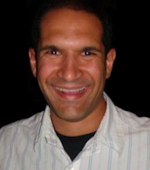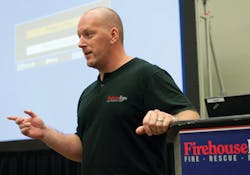Fort Worth Fire Capt. Larry Manasco is quick to take responsibility for the mistakes he made during a call early last year in which he and six of his colleagues became trapped following a roof collapse.
He told attendees at Firehouse Expo in Baltimore this past weekend that the culture in the fire service is such that more people don't come forward to talk about their missteps following close calls.
View Coverage of Firehouse Expo 2011
"When something happens in our departments and it's not about us, we are all the biggest armchair quarterbacks and that's why more stories like mine don't get told," he said.
It was Jan. 29, 2010 and Engine 3 was dispatched to a structure fire at a one-story duplex at 2855 Avenue A.
Manasco said that that day, a series of events occurred at an otherwise ordinary structure that almost turned fatal for his crew.
"All these different dominos started to fall and we almost killed seven firefighters," he said. "It's the only time I thought I was going to die. I truly thought: 'This is it. I'm about to burn.' "
He woke up inside the station to the alarm and saw a fellow firefighter flying by him. At that moment he knew it was a fire and kicked it into gear.
The first -- and most vital mistake -- Manasco said he made that day was to push his responding button instead of verbally notifying dispatch of his response. He did this to cut down on radio traffic, but he would soon find out that his decision may have cost him his life.
He was on the Channel 2, which was the department's primary fire channel, but he later found out that since there were crews at a previous fire and traffic was sent to the secondary channel -- Channel 5.
Since the crews at the first fire were in the overhaul stage, Channel 2 was all but silent.
As Engine 3 approached the scene, he figured it was a false alarm because of the lack of radio chatter and even began to take off his air pack.
"Man was I wrong," he said. "When we turned the corner, it looked like the sun was coming up."
Another issue occurred when a caller told dispatch that there was a deaf man behind the house, but was misunderstood as saying there was a man trapped inside.
Manasco described the conversation over dispatch as the game of "telephone" that kids play. He said that he doesn't blame the dispatcher, who is also trained as a firefighter.
"She's tough. She can do it. She knows the job," he said. "That message just got tweaked a little and it made all the difference in the world."
The man had made it to safety before crews arrived, but they believed there was someone still inside the structure.
"Fort Worth is known as a very aggressive interior firefighter department," he said. "But if you are aggressive going in, you have to be just as aggressive staying out."
Since the commanding officer made the decision to go in, Manasco said he was just following orders.
"If I was the first on the scene, would I have gone in? Probably not."
The fire was raging, and at that point he remained on Channel 2, but still didn't question the lack of radio traffic.
"I just set it and forget about it."
He was with two veterans on a hoseline as they entered the right side of the duplex where they encountered heavy fire.
Five feet in, Manasco and the nozzle man began to fall through the floor nearly up to their knees. They would step out and it happened several more times, but they continued to press on.
"Common sense would tell you to back out, but we kept going," he said.
Truck 14's captain, who was originally in command, entered behind them. By that time they figured they had a bulk of the fire knocked down.
At that time, the new commanding officer ordered everyone out of the structure. Because Manasco was still on the wrong channel, he never heard the order.
Moments later, the roof collapsed down on them and started knocking them through the floor.
After the roof settled, Manasco called a Mayday. On the wrong channel, the crew at the scene of the earlier fire was confused and dispatchers were unable to locate where the Mayday call came from.
It took seven minutes until dispatch was able to get the message to the commanding officer at the Avenue A fire.
Under the pile of debris, things continued to become more dire.
"No, no, no," he thought to himself.
"I thought it was going to press down flat and kill us."
He was somehow able to knock down more fire with a nearby nozzle and began pressing up on the roof.
"I thought I was going to die," he said. "I was thinking, "Good job, you just killed all of your guys."
He heard Capt. Mark Rhodes yell "Everbody calm down." They weren't loud, but Manasco said they were like fish out of water.
Rhodes became free and began to help his fellow firefighters escape from the debris.
"I was tired," he said. "I remember thinking, I just need a break."
A fellow firefighter pulled him to safety.
"I don't know if I could have made it any further than that," he said. "I will forever love Rick McKinney."
All seven firefighters exited the structure and an ambulance transported him to the hospital for a shoulder injury.
"When we came out of there, our gear was smoking," he said, adding that the thermal lining in their jackets had turned black. "There was a tremendous amount of heat inside there."
Once they were out, firefighters continued to knock down the fire from the outside.
Now, more than a year after responding to that fire, Manasco hopes that his department has learned from it and that other firefighters around the country can as well.
"There were just so many red flags that went up that day. So many mistakes were made; I hope we learned from them."

Paul Peluso | Staff Writer
Paul Peluso is a Firehouse.com staff writer and has worked for the Web site since 2006. Previously, he worked as a reporter for several community newspapers located in the suburbs of Baltimore, Md. Since joining the newsteam, Paul has covered various fire service issues including fire sprinklers, grants, line of duty deaths and technology. While he started out at the Beltsville, Md. office, he has since moved to Florida where he works out of his home office in Tampa.






